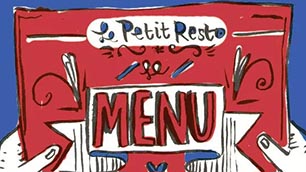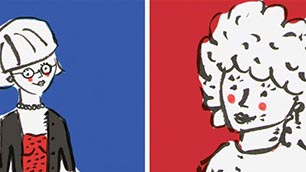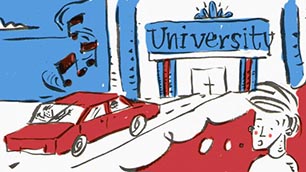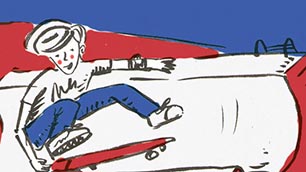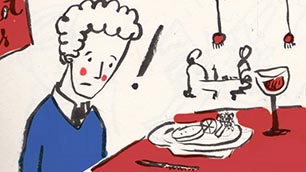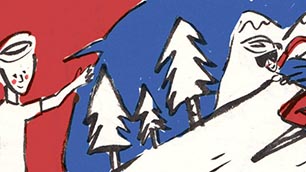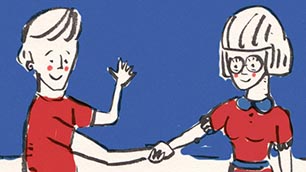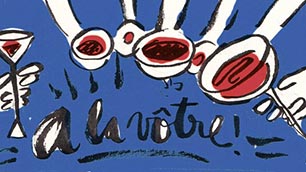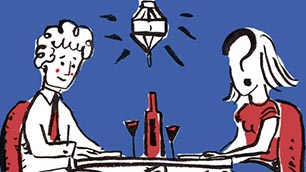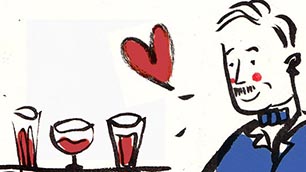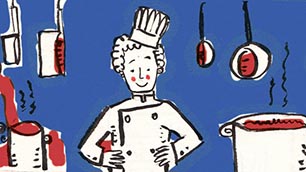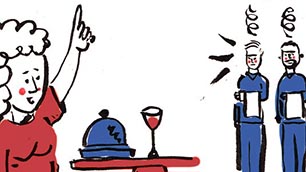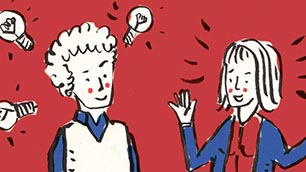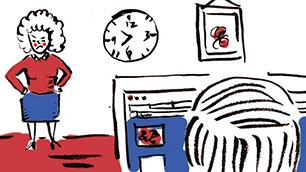ADJECTIVES
An adjective is a word that describes a noun or pronoun. The major differences between adjectives in French and English concern agreement and placement. In French, an adjective is usually placed after the noun it modifies and must agree in gender and number with the noun. In English, an adjective usually comes before the noun it modifies and is invariable; that is, it does not agree.
Formation
Adjectives agree in both number and gender with the noun or pronoun they modify. For regular adjectives, the masculine form is the base form to which endings are added. The feminine adjective is formed by adding an e. The plural adjective is formed by adding s. Look at the examples below to see the different adjective forms.
Examples:
| Il est petit. | He is short. |
| Elle est petite. | She is short. |
| Les hommes sont petits. | The men are short. |
| Les femmes sont petites. | The women are short. |
| Jeanne et Marc sont petits. | Jeanne and Marc are short. |
Note: the adjective takes the masculine plural when the nouns it modifies are of different genders: Jeanne et Marc sont petits.
Placement
1. After
Most adjectives follow the noun in French, unlike in English, where the adjective precedes the noun.
Examples:
| Marie et Monique sont des femmes charmantes. | Marie ant Monique are charming women. |
| Il aime le vin francais. | He likes French wine. |
| Bernard est un serveur poli. | Bernard is a polite waiter. |
| Ils sont intelligents. | They are intelligent. |
2. Before
There is a small group of adjectives, however, that normally precede the noun. These adjectives may be categorized as follows: Beauty, Age, Numbers Goodness, and Size (BANGS). Today, we’ll learn 2 common adjectives per category. Note that some have irregular forms.
| Masculine Singular | Feminine Singular | Masculine Plural | Feminine Plural |
| beau (beautiful) | belle | beaux | belles |
| joli (pretty) | jolie | jolis | jolies |
| jeune (young) | jeune | jeunes | jeunes |
| vieux (old) | vieille | vieux | vieilles |
| premier (first) | première | premiers | premières |
| deuxième (second) | deuxième | deuxièmes | deuxièmes |
| bon (good) | bonne | bons | bonnes |
| mauvais (bad) | mauvaise | mauvais | mauvaises |
| grand (tall, big) | grande | grands | grandes |
| petit (little, short, small) | petite | petits | petites |
Examples:
| Le vieux restaurant va ouvrir. | The old restaurant is going to open. |
| Qui est cette belle femme ? | Who is that beautiful woman? |
| Il y a de bonnes boulangeries ici. | There are good bakeries here. |
VERBE AVOIR & IDIOMATIC EXPRESSIONS
In episode 2, we learned some idiomatic expressions with avoir:
| avoir besoin (de) | to need |
| avoir peur (de) | to be scared (of) |
| avoir faim | to be hungry |
| avoir soif | to be thirsty |
| avoir chaud | to be hot |
| avoir froid | to be cold |
| avoir raison | to be right |
| avoir tort | to be wrong |
Today, we’ll learn a few other useful ones:
| avoir envie de + noun / + infinitif | to feel like + noun, to have a desire to + infinitive |
| avoir hâte de + infinitif | to be in a hurry to/to be anxious to + infinitive |
| avoir l’air de + infinitif | to appear + infinitive |
| avoir l’habitude de + infinitif | to be accustomed to + infinitive |
| avoir l’intention de + infinitif | to intend to + infinitive |
| avoir l’impression que | to be under the impression that |
| avoir rendez-vous avec | to have a date/appointment with |




